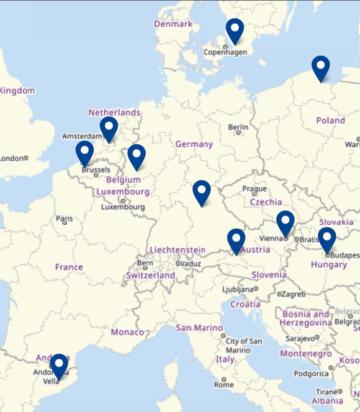Help us make the FRA website better for you!
Take part in a one-to-one session and help us improve the FRA website. It will take about 30 minutes of your time.

EU Charter of Fundamental Rights
Preambolu
Il-popli ta' l-Ewropa, bil-ħolqien bejniethom ta' unjoni dejjem iktar stretta, iddeċidew li jaqsmu bejniethom ġejjieni ta' paċi bbażat fuq valuri komuni. Konxja tal-wirt spiritwali u morali tagħha, l-Unjoni hi mibnija fuq il-valuri indiviżibbli u universali taddinjità tal-bniedem, tal-libertà, ta' l-ugwaljanza u tas-solidarjetà; hi bbażata fuq il-prinċipji ta' demokrazija u l-istat tad-dritt. Hija tqiegħed il-persuna fil-qalba ta' l-attivitajiet tagħha, billi tistabbilixxi ċ-ċittadinanza ta' l-Unjoni u billi toħloq spazju ta' libertà, sigurtà u ġustizzja.
L-Unjoni tikkontribwixxi għall-preservazzjoni u għall-iżvilupp ta' dawn il-valuri komuni filwaqt li tirrispetta d-diversità tal-kulturi u tat-tradizzjonijiet tal-popli ta' l-Ewropa kif ukoll ta' l-identità nazzjonali ta' l-Istati Membri u ta' l-organizzazzjoni ta' l-awtoritajiet pubbliċi tagħhom fil-livelli nazzjonali, reġjonali u lokali; hija tfittex li tippromwovi żvilupp bilanċjat u sostenibbli u tiżgura l-moviment liberu ta' persuni, ta' servizzi, ta' merkanzija u ta' kapital, kif ukoll il-libertà ta' stabbiliment.
Għal dan l-għan, hu meħtieġ li tiġi msaħħa l-protezzjoni tad-drittijiet fundamentali fid-dawl ta' l-evoluzzjoni tas-soċjetà, il-progress soċjali u l-iżviluppi xjentifiċi u teknoloġiċi, billi dawk id-drittijiet isiru iktar viżibbli f'Karta.
Din il-Karta tafferma mill-ġdid, fir-rispett tal-kompetenzi u l-kompiti ta' l-Unjoni, kif ukoll tal-prinċipju ta' sussidjarjetà, id-drittijiet kif jirriżultaw, b'mod partikolari, mit-tradizzjonijiet kostituzzjonali u mill-obbligi internazzjonali komuni għall-Istati Membri, mill-Konvenzjoni Ewropea għall-Protezzjoni tad-Drittijiet tal-Bniedem u tal-Libertajiet Fundamentali, mill-Karti Soċjali adottati mill-Unjoni u mill-Kunsill ta' l-Ewropa kif ukoll mill-ġurisprudenza tal-Qorti tal-Ġustizzja ta' l-Unjoni Ewropea u tal-Qorti Ewropea tad-Drittijiet tal-Bniedem. F'dan il-kuntest, il-Karta għandha tkun interpretata mill-qrati ta' l-Unjoni u ta' l-Istati Membri b'kont debitu meħud ta' l-ispjegazzjonijiet imħejjija taħt l-awtorità tal-Praesidium tal-Konvenzjoni li abbozza l-Karta u aġġornati taħt ir-responsabbiltà tal-Praesidium tal-Konvenzjoni Ewropea.
It-tgawdija ta' dawn id-drittijiet iġġib magħha responsabbiltajiet u dmirijiet kemm fir-rigward ta' ħaddieħor, kif ukoll fir-rigward tal-komunità tal-bnedmin u tal-ġenerazzjonijiet futuri.
L-Unjoni għaldaqstant tirrikonoxxi d-drittijiet, il-libertajiet u l-prinċipji elenkati hawn taħt.



